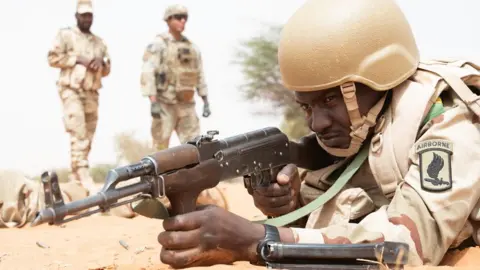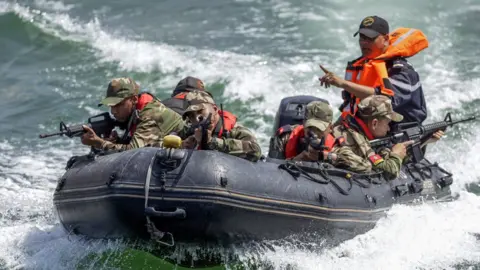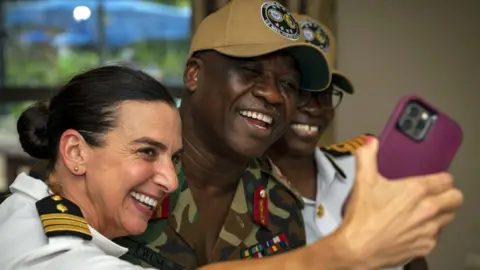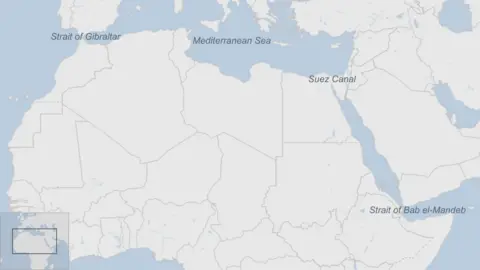How Trump's Africa strategy may become a double-edged sword
 AFP/Getty Images
AFP/Getty ImagesWith US President Donald Trump on a cost-cutting warpath since starting his second term, aid to Africa has been slashed and now defence spending is in his sights - but could these approaches cost more in the long run?
The phrase his administration presses on Europe to assume more of the costs of its own defence is "burden sharing". This is the challenge that Washington is now throwing down to African armies too - and they are far less comfortably resourced to take it on.
Moreover, having paid dearly in lives and money, in the struggle to hold back the spreading reach of jihadist armed groups across the Sahel, the Lake Chad basin and Somalia over recent years, they could be forgiven for feeling that they already carry much of the burden - and for the sake not just of their own continent but the wider international community too.
Benin, which has lost more than 80 soldiers in jihadist attacks since the start of the year, is just one example.
"The epicentre of terrorism on the globe" is how the Sahel was described a few days ago by Gen Michael Langley, who as head of US Africa Command (Africom) oversees the American military presence south of the Sahara.
In briefings and interviews over the past few weeks, he has graphically outlined the threat that jihadist groups will present if their push southward towards the Gulf of Guinea succeeds.
"One of the terrorists' new objectives is gaining access to West African coasts. If they secure access to the coastline, they can finance their operations through smuggling, human trafficking and arms trading. This not only puts African nations at risk but also raises the chance of threats reaching US shores."
Gen Langley has admitted that the current upsurge in militant attacks is "deeply concerning".
Yet he has also repeatedly hammered home a core message: the US is minded to rein back its own sub-Saharan military operations, leaving local armies to take on more of the defence burden.
Some 6,500 personnel are currently deployed in Africa by the US military and a 2019 list published by Africom mentioned 13 "enduring" American bases across the continent and a further 17 more temporary facilities.
But some of these installations, including the purpose-built drone base at Agadez in Niger, have already been shut down, in particular after military juntas seized power in Niger, Mali and Burkina Faso since 2020.
And it now looks as if the once-ambitious American operational footprint will be pruned back quite a lot more.
Perhaps we will see more air power deployed from offshore to hit militant targets - Gen Langley says there have been 25 strikes in Somalia this year, double the 2024 total - but a much thinner permanent on-the-ground military presence.
"Some things that we used to do, we may not do anymore," he recently told a conference in Kenya's capital, Nairobi, that brought together chiefs of defence staff and other senior officers from 37 countries.
"Our aim is not to serve as a permanent crutch, but to achieve US security objectives that overlap with our partners. We should be able to help African nations build the self-reliance they need to independently confront terrorism and insurgencies."
In the bluntness of his language Gen Langley reflects the stark change of outlook and policy that has come from January's change of power at the White House.
"We have set our priorities now - protecting the homeland."
What matters to the no-longer-so-new Trump II administration, the general made clear in a Pentagon publication last week, is fighting terrorists - particularly those who might attack the US.
Other priorities are countering the spread of Chinese military influence across Africa and protecting freedom of maritime navigation through key trade choke points such as the Strait of Gibraltar and the Mediterranean, the Suez Canal and the Bab el-Mandab Strait at the southern end of the Red Sea.
 AFP/Getty Images
AFP/Getty ImagesIn some respects, the focus on training and capacity building that Gen Langley now expounds is not so very different from the approach of previous American administrations, Republican as well as Democrat.
He lauds the National Guard State Partnership Program, through which individual US states have been helping to build the capacity of government security forces across Africa and other parts of the world - for the past three decades.
France too is pursuing this approach, with the closure of bases in Chad and Senegal, while those in Ivory Coast and Gabon have been handed over to their governments, with only small French training teams left behind to work alongside African colleagues.
However, in other respects, the Trump administration's Africa strategy represents a drastic shrinkage in outlook and - critics might argue - a conscious retreat from addressing the factors that drive instability, conflict and terrorism, particularly in the Sahel, which is among the poorest regions on the planet.
For under President Joe Biden the US looked far beyond the military realm alone in its efforts to counter the both the growing reach of jihadist groups and other sources of violence. And Gen Langley, as Africom chief, was an articulate exponent of this much broader thinking.
Only last year, in an interview with the Associated Press news agency, he outlined what he described as a "whole of government" response to the proliferation of conflict, stressing the importance of good governance and action to tackle the fragilities of African states and the impacts of desertification, crop failure and environmental change.
This approach openly recognised that recruitment by armed groups and the spread of violence is fuelled not only by jihadist ideology, but also by a host of social and economic factors, including the stresses now afflicting farming and pastoralist livelihoods.
Gen Langley himself does not seem to have abandoned this analysis, recently noting how Ivory Coast had countered the jihadist threat to its northern border areas by complementing security force deployments with development projects.
He could equally have pointed to the success of a similar approach pursued by the president of Niger, Mohamed Bazoum, before he was deposed in the July 2023 coup.
 Africom
AfricomBut of course, these days Africom must operate within the context of a US foreign policy radically reshaped under Trump.
There are even rumours that it could be downgraded to become a subsidiary of the US command in Europe and Gen Langley suggests African governments should tell Washington what they thought of this idea.
Already the separate Africa unit at the radically slimmed down National Security Council at the White House is reportedly being wound up and integrated into the Middle East-North Africa section.
Its director, Gen Jami Shawley, an Africa specialist appointed to the role only in March, has now been assigned to more general strategic functions.
Addressing Congress this week, Gen Langley warned about China's and Russia's African ambitions: Beijing's agility at capitalising on the US's absence and Moscow's ability to seize military opportunities created by chaos and instability.
Given these concerns, some might wonder if the general is discreetly signally his doubts about a slimmed down Africa strategy.
Meanwhile, under the "efficiency drive" led, until recently, by tech billionaire Elon Musk, the American government's main international development agencies, USAID and the Millennium Challenge Corporation, have been effectively shut down.
The spine of the new US economic engagement with Africa is now private sector trade and investment.
But business generally needs to operate in a stable and secure context - which Africa's most fragile and violence-prone regions cannot offer.
And in winding up the American development agencies, the Trump administration has stepped aside from funding the rural projects and social programmes that sought to address land and water pressures and lack of economic opportunity, the key drivers of conflict - and the jihadist groups' recruitment of frustrated rural young people.
For the fragile regions that are the main sources of jihadist violence the US response is reduced to the purely military, and now it is seeking to shift even most of that on to the shoulders of African states that already struggle to respond adequately to a plethora of challenges and responsibilities.
Paul Melly is a consulting fellow with the Africa Programme at Chatham House in London.

You may also be interested in:
 Getty Images/BBC
Getty Images/BBCGo to BBCAfrica.com for more news from the African continent.
Follow us on Twitter @BBCAfrica, on Facebook at BBC Africa or on Instagram at bbcafrica
